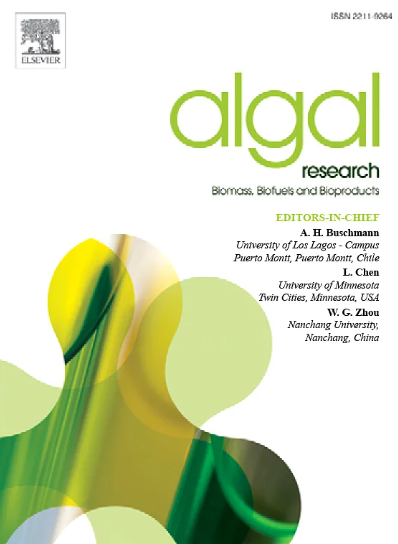Machine learning-assisted synthetic biology of cyanobacteria and microalgae
IF 4.6
2区 生物学
Q1 BIOTECHNOLOGY & APPLIED MICROBIOLOGY
Algal Research-Biomass Biofuels and Bioproducts
Pub Date : 2025-01-11
DOI:10.1016/j.algal.2025.103911
引用次数: 0
Abstract
Cyanobacteria and microalgae have recently been utilized as autotrophic chassis for microbial cell factories capable of converting light and CO₂ directly into high-value products. However, compared to other heterotrophic model chassis, they face many challenges such as limited genetic manipulation tools, poorly understood metabolic regulatory networks, and low production efficiency. Machine learning, a data-driven pattern recognition strategy, leverages statistical associations in datasets for classification and generation, proving to be a valuable tool for synthetic biology. Synthetic biology requires the extraction of fundamental component information from complex biological data to create novel applications through the reassembly of biological components. This process aligns well with the capabilities of machine learning. In this review, we briefly introduce the recent progress on how machine learning has assisted in genome reannotation, contributed to the development of genetic manipulation tools, elucidated metabolic networks, and optimized bioprocesses in cyanobacterial and microalgal studies within the context of synthetic biology. Additionally, we analyze the current challenges facing this field and provide perspectives on further research directions for applying machine learning to synthetic biology in cyanobacteria and microalgae.
求助全文
约1分钟内获得全文
求助全文
来源期刊

Algal Research-Biomass Biofuels and Bioproducts
BIOTECHNOLOGY & APPLIED MICROBIOLOGY-
CiteScore
9.40
自引率
7.80%
发文量
332
期刊介绍:
Algal Research is an international phycology journal covering all areas of emerging technologies in algae biology, biomass production, cultivation, harvesting, extraction, bioproducts, biorefinery, engineering, and econometrics. Algae is defined to include cyanobacteria, microalgae, and protists and symbionts of interest in biotechnology. The journal publishes original research and reviews for the following scope: algal biology, including but not exclusive to: phylogeny, biodiversity, molecular traits, metabolic regulation, and genetic engineering, algal cultivation, e.g. phototrophic systems, heterotrophic systems, and mixotrophic systems, algal harvesting and extraction systems, biotechnology to convert algal biomass and components into biofuels and bioproducts, e.g., nutraceuticals, pharmaceuticals, animal feed, plastics, etc. algal products and their economic assessment
 求助内容:
求助内容: 应助结果提醒方式:
应助结果提醒方式:


